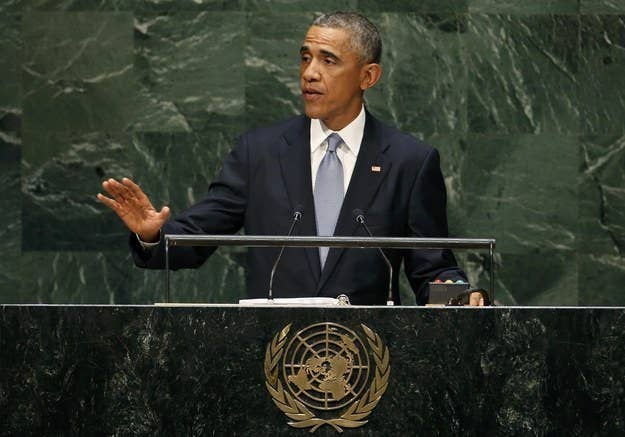
President Obama urged Muslim-majority nations to actively reject extremist religious rhetoric and ideology in a speech to the U.N. General Assembly Wednesday, calling on them to embrace the war launched by the United States and its allies against ISIS in Syria this week.
The military action is the only way to send a message to ISIS, Obama said.
"There can be no reasoning — no negotiation — with this brand of evil," Obama said, calling ISIS a "network of death."
"The only language understood by killers like this is the language of force." Obama said.
Obama rejected ISIS's claims of devotional Muslim faith.
"No god condones this terror," Obama said. As he has in the past, he rejected the idea that America was divided from the Muslim world.
"When it comes to America and Islam, there is no us and them — there is only us, because millions of Muslim Americans are part of the fabric of our country," Obama said. "So we reject any suggestion of a clash of civilizations."
The president called on Islamic-majority nations to draw a line against ISIS and similar ideology.
"It is time for the world — especially Muslim communities — to explicitly, forcefully, and consistently reject the ideology of al-Qaeda and ISIL," Obama said. "There should be no more tolerance of so-called clerics who call upon people to harm innocents because they are Jewish, Christian, or Muslim."
In a wide-ranging speech, Obama described a world that was smaller and more interconnected in the decades since the Cold War ended. He took Russia to task for invading the Crimea region of Ukraine, accusing America's Cold War adversary of acting like a "bully."
Obama said the Ukraine situation embodied "a central question of our global age: whether we will solve our problems together, in a spirit of mutual interests and mutual respect, or whether we descend into destructive rivalries of the past."
The president said new threats like Ebola, climate change, and growing economic globalization make it impossible for a country to "insulate itself from global forces." World leaders need to work more closely together than ever before, Obama said.
While describing the racial, cultural, and social divisions that still plague many nations, the president said America needs to look in the mirror, too.
"I realize that America's critics will be quick to point out that at times we too have failed to live up to our ideals; that America has plenty of problems within our own borders. This is true. In a summer marked by instability in the Middle East and Eastern Europe, I know the world also took notice of the small American city of Ferguson, Missouri — where a young man was killed, and a community was divided," Obama said. "So yes, we have our own racial and ethnic tensions. And like every country, we continually wrestle with how to reconcile the vast changes wrought by globalization and greater diversity with the traditions that we hold dear."
But most of his speech was focused on Muslim-majority nations, where the president said the fight against extremism has to begin.
"Ultimately, the task of rejecting sectarianism and extremism is a generational task — a task for the people of the Middle East themselves," Obama said. "No external power can bring about a transformation of hearts and minds."
